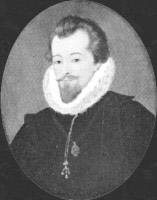John Dowland was the greatest English
lutenist and song composer. The late sixteenth century saw the
development of the lute as an instrument to accompany consort
songs, and m England a distinctive song type evolved: the ayre.
This form, for solo voice with lute or viols, supplanted the
madrigal in popularity. It was as a composer of ayres that Dowland
excelled.
Dowland travelled extensively in Europe,
partly because he had failed to gain a position as royal lutenist
to Elizabeth I. At the age of 17 he had spent a period
in Paris, in service to Sir Henry Cobham, the Ambassador to the
King of France, during which time he converted to Catholicism; and
it is no doubt partly as a result of this that he may have felt
more comfortable on the Continent. He himself was convinced that
his Catholic sympathies led to prejudice against him at the
English court. In the 1 590s he was received at various courts in
Germany, including that of the Duke of Brunswick and the Landgrave
of Hesse at Kassel, and in Italy. In Florence he met up with other
disenchanted English Catholics, only to discover that they were
plotting to assassinate Queen Elizabeth. He immediately moved on
to Nuremberg. From there, in November 1595, he wrote to Sir Robert
Cecil in England exposing the Catholics' plot. After this he
probably returned to Hesse.
In 1598 Dowland was employed as a
lutenist - for a very high salary — at the court of King Christian
of Denmark. Five years later, after receiving funds for his latest
book of music, he returned to London, where he met with Queen
Anne. In 1605 he went back to Denmark, but the pressure of his
accruing debts forced him home again, where in 1 609 he entered
the service of Lord Walden, a man well connected with royal
circles; in October 1612 he eventually gained a position as
lutenist to King James I. Despite the royal appointment,
he never enjoyed as great a
renown in England as he did abroad.
Dowland wrote a great number of
pieces for solo kite, many in dance forms; sacred music such as
psalms; and four books of ayres (1597-1612) that were widely
published and achieved immense popularity. Descriptions of the
composer indicate a certain duality of character; he is variously
described as "a cheerful person ... passing his days in lawful
merriment" and as a man "filled with melancholy." This ambivalence
is reflected m his music, where his light and tuneful English
ayres contrast sharply with other more sombre pieces such as "In
darkness let mee dwell." With his ability to give intense musical
expression to the emotion of the poetry, using rhythmic devices
and techniques such as word-painting, it is in his gentler,
elegiac songs that Dowland's talent is without rival.
|


No comments:
Post a Comment